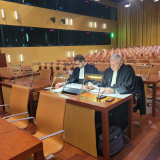
Legal experts come together for first physical event of 2022
''Gambling Regulation And Gambling Taxation:
Two Sides Of The Same Coin?''
Taxation can be a powerful tool to create a level playing field for all the gambling operators on the market, but in particular in the fight against illegal operators. Taxation might also be an instrument to regulate markets and contribute to compliance in responsible gambling programmes. Or even be a crowbar in enforcing CSR goals?
Hosted by Loterie Nationale Loterij in Brussels, legal experts in the EL Membership gathered for the first physical EL event in two years. The Legal Seminar (12-13 May 2022) brought together participants to discuss the importance of taxation as a tool to regulate gambling.
Jannie Haek, CEO of Loterie Nationale Loterij (BE)
Welcomed by Jannie Haek, CEO of Loterie Nationale Loterij (Belgium) and Supervisory Chair of the EL Legal and Regulatory Working Group, participants first had the opportunity to go back in time and reflect on the great lottery invention, born 580 years ago in 1441 in Bruges. A short video showcased the special celebration to mark this anniversary held by Loterie Nationale at the end of 2021.
Arjan van ‘t Veer, Secretary General of EL
The two-day seminar moderated by Haek and Arjan van ‘t Veer, Secretary General of EL then moved to the present moment and focused on topics such as different gambling taxation regulatory models in Europe, relevant gambling taxation related case-law of the European Court of Justice (ECJ), latest developments in the OECD and EU on taxation of digital economy, and taxation as a tool to fight illegal gambling operators.
Filip Smet, Director, Tax Dispute Resolution, Deloitte Legal (Belgium) opened by presenting taxation as an instrument for regulation, where the main functions of taxation include financial, redistribution and regulatory. Smet pointed out some limitations on taxations as means of regulations including a Dutch case concerning taxation on gaming and betting for slot machines, state aid, a Belgian case concerning VAT on online gaming and betting, Belgian legislative proposal 0508 concerning additional tax on online gaming and betting activities via non-licensed operators and Belgian legislative proposal 0509 with a level playing field between operators of online gaming and betting established in Belgium and operators established abroad.
Regulation by taxation will only be successful if it can be enforced, but regarding gaming and betting tax, this is in the words of Smet, “notoriously difficult”. The biggest issue is the subject of the taxation. If regulation is the goal, the operator should be (remain) the taxable person (as opposed to the player). Enforceability by tax authorities is limited to national operators and there is absence of efficient international cooperation. EU and international taxation rules do offer great opportunities for taxation as a tool for regulation.
Philippe Vlaemminck, EL’s Legal Advisor and Partner, Vlaemminck Law (Belgium) focused his presentation on gambling taxation and case-law of the Court of Justice of the EU (ECJ). He highlighted that the fundamental tax rule in gambling is that there is no discrimination between the treatment of national gambling services and winnings & foreign services and winnings. Vlaemminck also looked at how to fight illegal gambling through taxation.
The principle of fiscal neutrality prevents a generalised distinction from being drawn in the levying of VAT between unlawful and lawful transactions. Member States cannot reserve the exemption or the application solely to lawful games of chance. They must respect the principle of fiscal neutrality and cannot validly make that exemption dependent upon the identity of the operator of such games and machines. It can be relied on by an operator of games of chance or gaming machines before national courts to prevent the application of rules of national law which are inconsistent with that provision. The principle of fiscal neutrality only applies to the harmonised system, and Member States have the right to tackle specifically illegal operators with taxes outside the scope of harmonised taxes.
Filip Smet, Director, Tax Dispute Resolution, Deloitte Legal (BE) & Philippe Vlaemminck, EL’s Legal Advisor and Partner, Vlaemminck Law (BE)
Pieter Remmers, Secretary General, European Association for the Study of Gambling, CEO, Assissa Consultancy (NL)
Pieter Remmers, Secretary General of the European Association for the Study of Gambling and CEO of Assissa Consultancy (The Netherlands) finished the first day by discussing taxation as an essential way to enhance responsible gaming. He focused particularly on several studies including ‘‘taxation and the regulation of smoking, drinking and gambling in the EU’’, ‘‘taxes, social responsibility and tax administrations’’, ‘‘taxation and the demand for gambling’’, and ‘‘liberalisation of the lottery market in the Netherlands: Potential psychosocial impacts and how to minimise them’’.
On day two participants had the opportunity to learn about taxation models in different countries, initiatives taken by the OECD and the fight against illegals. Up first was Thomas van Ditzhuijsen, Tax Lawyer (Indirect Tax), KPMG Meijburg (The Netherlands) who focused on lottery taxation systems in the EU. Challenges of the various systems include local challenges but also the responsibility for cross border players to be tax compliant.
Zsofia Siegler Manager, Andersen Tax (Luxembourg) then gave an update on the OECD Tax Reform Plan and the Base Erosion and Profit Shifting Action Plan (BEPS) resting upon a two pillar approach – to change the profit allocation and nexus rules to expand the taxing rights of market jurisdictions, and to address the challenges of tax competition between jurisdictions by imposing a minimum 15 percent effective tax rate.
Giuseppe Pelle, Institutional Relations Manager, IGT Lottery and Executive Chair of the EL Taskforce on Illegal Gambling finished the session by highlighting the importance of fighting against illegal operators, considering the options of a new regulation and next taxation. Fair taxation would equal for example, fair competition. Could a new taxation be a tool against the illegal offer?
From left to right: Thomas van Ditzhuijsen, Tax Lawyer (Indirect Tax), KPMG Meijburg (NL), Zsofia Siegler Manager, Andersen Tax (LU), Giuseppe Pelle, Institutional Relations Manager, IGT Lottery & Executive Chair of EL Taskforce on Illegal Gambling (IT)
In 2021 EL’s Taskforce on Illegal Gambling collected data from EL Members on the state of play on national developments to stop illegal gambling as well as to understand better the phenomenon as such. First impressions upon this are that illegal gambling is widely spread in the jurisdictions where the EL Members are active. Often there is a lack of interest, knowledge, and the right legal means to effectively stop illegal activities. By doing so, the regulated operators such as the individual EL Members find themselves often in an unlevelled playing field. Illegal gambling is one of the biggest threats to the EL gambling model. On one hand by not respecting national regulations, players are often directly or indirectly set to riskier behaviour. On the other hand, illegal operators are offering unfair competition to legal, well-regulated operators. Fighting illegal gambling and monitoring the developments in this field is an important activity of EL, especially for this dedicated Taskforce.
To conclude, EL Members are committed to providing continuous care to channelling the gambling desire of the population towards a regulated and responsible offer of gambling products, which is also promoted by the responsible gambling compliance programme of EL. Upon the 2019 EL Antwerp Resolution they call as well for a risk-based approach towards gambling advertisement. EL Members consider that taxation is an important lever that can be used to lower the attractiveness of gambling products and thus to protect players (among other high pay-outs and increased levels of addictiveness connected to these high-level pay-out levels). Taxation is a dossier that will be followed closely by EL.
Jannie Haek called upon the attendees to invest time in the coming years in this complex dossier and invited all to think further on the possible implications of taxation developments as regulatory tool. Looking at the supranational initiatives, but also at the increasing demand from the legal sector to have a level playing field, taxation is a topic that will only grow in importance among policymakers in the coming years. It is an important opportunity for EL to have thorough strategic reflections on this topic in order to be able to proactively help determine policy initiatives in this field.






